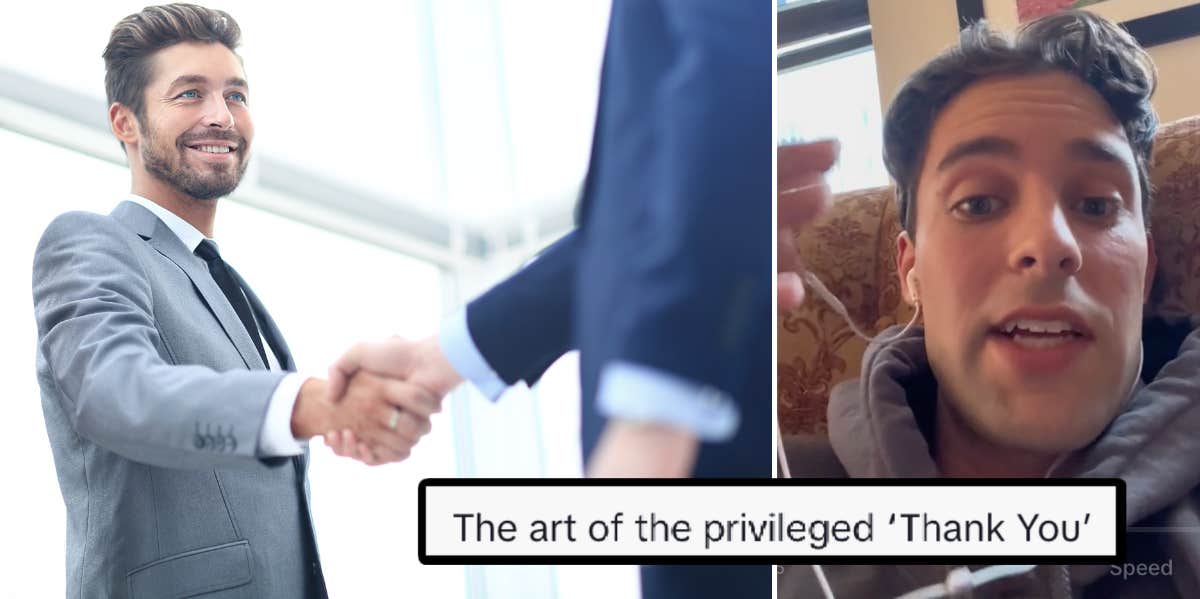Financial Aid Student At Boarding School Shares The Strategic Way Privileged Kids Use 'Thank You' To Look Like They Belong
They use the phrase "thank you" differently than most people who didn't grow up with money, and it makes all the difference
 ASDF_MEDIA via Shutterstock / @thejaunt via TikTok
ASDF_MEDIA via Shutterstock / @thejaunt via TikTok Many of us have been taught by our parents to effusively thank everyone who does us a favor or gives us an opportunity. But is that sending the wrong signal? A student at an elite boarding school thinks so, and he says it's the greatest lesson he's learned from his uber-privileged classmates.
The financial aid student shared how privileged kids' use of the phrase 'thank you' helps them get ahead in life.
There's no question that by practically every measure, from access to education and getting better jobs to healthcare access and incomes, wealthy kids have it a whole lot easier in life, especially as America's runaway wealth inequality gets more and more pronounced seemingly by the minute.
In short, having money makes it easier not only to live but also to get more money to make it even easier to live. But a low-income student at an elite boarding school has learned that there's more to this dynamic than just the money itself. The way rich kids navigate social situations is also part of what greases the wheels for them, and the way privileged kids use thank you is a key part of it.
The student says privileged kids use 'thank you' strategically to make them seem like they belong in elite spaces and deserve elite opportunities.
"One of the mind-blowing things that I learned from going to boarding school with the most privileged kids in the world," Jack, a student and writer known on TikTok as @thejaunt, said in a recent TikTok, "is that they're extremely strategic and selective about how they show gratitude and deploy thank yous."
The difference, he says, lies in the fact that his wealthy classmates never effusively thank anyone for anything — they simply say thank you once and move on. "And the reason they do that is not because they're not grateful," he went on to say, "it's because they don't want to show that they don't belong or they don't deserve something."
He used as an example a student getting a call from a powerful businessman or politician, say for an internship opportunity. "They don't go, 'thank you so much, you have no idea how grateful I am, I feel like I'm dreaming,'" like many of us would, he says. "They go, 'thank you so much, Mr. Blah Blah. I wanted to talk about this.' And when you have that solid, sincere thank you, it gives the impression that maybe this kid belongs on this phone call. Maybe he actually deserves it."
The TikToker says this is a key way that those who don't come from privilege can help them compete on a similar playing field. "The irony is, you don't really have to be privileged," he says, "you don't actually have to belong or deserve it to give that impression. You just have to have the confidence and just restrict your gratitude."
The student's observations is in line with research about what wealthy people tend to teach their kids that lower-income parents don't.
Studies have shown that a focus on social skills — like how to navigate power structures, for just one example — is one of the key differences between what wealthy and lower-income parents teach their children. And it has real-world impacts: A joint study between Pennsylvania State and Duke Universities, which followed 700 kids from kindergarten to 25, showed a significant correlation between being taught these skills as kids and success as adults.
Studies have also shown that self-confidence can make all the difference when navigating inherently unfair systems like job markets, for example, and some experts have suggested incorporating this kind of skillset into school curricula.
Self-confidence is precisely what @thejaunt's observed way privileged kids use thank you shows. It says, "I am worthy of this opportunity, I am deserving of this attention."
And that tends to be the opposite of the way lower-income people and other marginalized people present themselves in power-driven environments like the workplace — like the much-talked-about way many women tend to add qualifiers like "I don't know if that makes sense" to the ends of their statements at work, a sort of subconscious apologizing and self-humbling.
As @thejaunt put it, "gratitude is this weird thing where it's like, if you overly express it, it loses its value" — a sort of law of diminishing returns. So let's all stop saying thank you so much and just act like we're worthy of the spaces we find ourselves in. Because we are, and one "thank you" is enough.
John Sundholm is a news and entertainment writer who covers pop culture, social justice and human interest topics.
